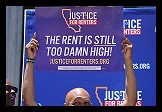 We've been cautiously hopeful for months on The BradCast about President Biden's landmark plan to replace fossil fuel power generation at the nation's utility companies with clean renewable electricity in his Build Back Better (BBB) Act. Those hopes came crashing down on Friday night when the New York Times reported the White House was redrawing its expansive social safety net and climate change reconciliation budget package to remove the landmark Clean Electricity Performance Program (CEPP) at the insistence of Democratic coal country Senator Joe Manchin of West Virginia. [Audio link to full show is posted at bottom of this summary.]
We've been cautiously hopeful for months on The BradCast about President Biden's landmark plan to replace fossil fuel power generation at the nation's utility companies with clean renewable electricity in his Build Back Better (BBB) Act. Those hopes came crashing down on Friday night when the New York Times reported the White House was redrawing its expansive social safety net and climate change reconciliation budget package to remove the landmark Clean Electricity Performance Program (CEPP) at the insistence of Democratic coal country Senator Joe Manchin of West Virginia. [Audio link to full show is posted at bottom of this summary.]
The program had been the centerpiece for Biden's vow to reach an 80% reduction in greenhouse gas emissions in the electricity sector by 2030, towards the goal of net zero emissions economy-wide by 2050. That was to have been accomplished with the key provisions of the CEPP's carrot and stick approach, offering major financial incentives to utilities for moving quickly to clean energy and financial penalties for those who did not. As climate and energy reporter David Roberts explained on this program over the summer, along with incentives to encourage the move to electric vehicles and the electrification of buildings in the Biden agenda, the result of the CEPP would have been a major cut in emissions over all, as those polluting sectors were also moved onto a newly clean electric grid.
Alas, Manchin, who makes millions of dollars from the fossil fuel industry --- both to his personal pockets and campaign coffers --- will reportedly have none of it. That leaves the White House and climate hawks now scrambling to figure out alternative ways to cut deadly greenhouse gasses fueling our climate crisis just weeks before the next U.N. climate summit in Glasgow, when the Administration had hoped to showcase the effort and call for similarly decisive climate action from other nations.
We're joined today by DR. LEAH STOKES, climate researcher and political scientist at UC Santa Barbara, following her testimony to the Joint Economic Committee in Congress last month on the necessity of the electrification of American homes and buildings, to curb fossil fuel usage, improve the health of Americans ("Children growing up in a home with a gas stove have a 42% increased chance of having asthma," she notes) while creating millions of good new jobs.
Stokes, ironically enough, is now literally on the edge of another major climate change-fueled wildfire in the canyons above Santa Barbara. "Yes, it was a bit of tragic symbolism that when the news was breaking that Manchin would not go for the most important part of the climate package, that we had a fire once again in Santa Barbara burning away," she tells us, before adding the encouraging news that the Alisal Fire is now mostly under control after scorching nearly 20,000 acres and burning several homes and buildings.
"In the Build Back Better Act, there are investments to help people transition and switch out gas stoves and gas furnaces for these kinds of new technologies --- induction stoves, heat pumps, etc.," Stokes explains. "Were that policy to make it through Congress, it would deliver some help for people to change to these kinds of new, cleaner technologies."
Of course, the question is what, if anything, will survive the approval of fossil fuel fan boy Manchin in the BBB. As Stokes details: "Within that package, there was supposed to be a really big chunk, $670 billion, for climate investments. That would be the biggest investment we have ever made in climate action. Unfortunately, $150 billion of that money, about 25% of it, was going to be for the Clean Electricity Performance Program," she says. "So the question is how can we ensure that we are still spending that $670 billion? How can we make sure that we have every dollar for climate spending, and we go and try to find every single ton of carbon pollution that we can cut?"
That, of course, is the question of the hour. "The thing about climate change is that we have to actually take it on at the scale that it's necessary. We can't say 'Well, we did two-thirds of it, and that was good enough.' We have to limit warming to 1.5 degrees [above the pre-industrial global average]. That's what scientists have told us we have got to do, and that means we have to cut carbon pollution by 50% this decade. That's what President Biden has pledged to do. But unless we fill the hole left by the Clean Electricity Performance Program, we're not going to deliver on that pledge."
So how can it and will it be done? The White House claims they have alternative ideas. But will they meet Manchin's demands? We discuss. Stokes also responds to Manchin's supposed reasons for objecting to the CEPP --- because it jeopardizes "America's energy independence" and because the government is not needed to pay for efforts that private utilities are already taking on --- detailing why both of those claims are simply nonsense.
"The $150 billion, which was about 25% of the carbon cutting investments in this package, that has got to go towards other programs," Stokes insists. "We can't just say, 'Well, we're going to magically find all these ways to cut carbon pollution for free. No. We need to have investments at the scale of the crisis. There can be other ways to cut carbon pollution, but they need to have real investments behind them. We cannot cut a dollar of the climate spending."
The ever-optimistic Stokes talks me off the ledge by noting that while none of this will be easy, "despair is not an option". She urges listeners to visit Call4Climate.com to help reach your members of the House and Senate, with a useful script to help pressure members to do the right thing for the planet, for humanity, and, if nothing else, for each and every family who will now face the ever increasing costs and dangers of our climate crisis.
"People should not lose hope. They should not feel like this is not a meaningful package, that we're not going to deliver on climate. We are," Stokes maintains. "We just need to make sure that the White House does not cut a dollar of spending, and that they make sure that they're going to make up for the lost pollution cuts from removing the Clean Electricity Performance Program...This is a really transformative bill. It's very close to passage, and people should keep the pressure up."
Next up today, some breaking news out of Brazil, where a Congressional panel there is set to recommend "mass homicide" and "genocide" charges against its very Trumpy President, Jair Bolsonaro, for his deadly mishandling of the coronavirus pandemic. Even if you don't follow Brazilian politics, you'll find the reasons for the panel's recommendations sound incredibly familiar, including Bolsonaro's unscientific recommendations for the use of hydroxychloroquine and the horse de-worming drug Ivermectin to prevent and treat COVID, his failure to deliver vaccines to the public, and his (an his sons') creation of disinformation networks to discourage masking and social distancing. Ya know, the same stuff that has resulted in wingnut radio host Dennis Prager, here in the U.S. this week, contracting COVID, after more than 700,000 have died from the disease in the U.S., many, just like in Brazil, unnecessarily due to the criminal negligence of our own former President. When will Congress recommend criminal charges against him for the very same thing?
Finally, just in case you didn't get enough environmental news (and worries) on today's program, Desi Doyen joins us for our latest Green News Report, with at least one or two news items that may help you (and me) rethink the idea of throwing ourselves off a bridge...
(Snail mail support to "Brad Friedman, 7095 Hollywood Blvd., #594 Los Angeles, CA 90028" always welcome too!)
|


 The GOP 'Voter Fraud'
The GOP 'Voter Fraud' 'Green News Report' 10/31/24
'Green News Report' 10/31/24
 'Closing Arguments'
'Closing Arguments' Trump Promises to be a Lawless, Authoritarian President. Believe Him: 'BradCast' 10/29/24
Trump Promises to be a Lawless, Authoritarian President. Believe Him: 'BradCast' 10/29/24 'Green News Report' 10/29/24
'Green News Report' 10/29/24 Election Heats Up: Ballots Burn, Billionaires 'Obey in Advance', Callers Ring In: 'BradCast' 10/28/24
Election Heats Up: Ballots Burn, Billionaires 'Obey in Advance', Callers Ring In: 'BradCast' 10/28/24 Musk's Privatized Internet Satellite System Threatens U.S. National Security
Musk's Privatized Internet Satellite System Threatens U.S. National Security Sunday 'VOTE NOW!' Toons
Sunday 'VOTE NOW!' Toons Harris on Hope, Trump's Fasc-ism in Bumpy Closing Days: 'BradCast' 10/24/24
Harris on Hope, Trump's Fasc-ism in Bumpy Closing Days: 'BradCast' 10/24/24 'Green News Report' 10/24/24
'Green News Report' 10/24/24 Kelly on Trump: 'Fascist', Admires Hitler, Disrespects Constitution and Disabled Vets: 'BradCast' 10/23/24
Kelly on Trump: 'Fascist', Admires Hitler, Disrespects Constitution and Disabled Vets: 'BradCast' 10/23/24 Accountability Comes For Rudy, Other Election Deniers: 'BradCast' 10/22/24
Accountability Comes For Rudy, Other Election Deniers: 'BradCast' 10/22/24 'Green News Report' 10/22/24
'Green News Report' 10/22/24 Elon Musk's 'Vote Buying' and Lying for Trump: 'BradCast' 10/21/24
Elon Musk's 'Vote Buying' and Lying for Trump: 'BradCast' 10/21/24 Sunday 'High Anxiety' Toons
Sunday 'High Anxiety' Toons 'Green News Report' 10/17/24
'Green News Report' 10/17/24 Fake v. Real Censorship and Trump/Fox Fetish-ized Grievance World: 'BradCast' 10/17/24
Fake v. Real Censorship and Trump/Fox Fetish-ized Grievance World: 'BradCast' 10/17/24 'Americans Aren't Prepared for Trump's Police State': 'BradCast' 10/16/24
'Americans Aren't Prepared for Trump's Police State': 'BradCast' 10/16/24 Good News for Georgia Voters, the Economy and Kamala Harris: 'BradCast' 10/15/24
Good News for Georgia Voters, the Economy and Kamala Harris: 'BradCast' 10/15/24 Fascism Comes to America: 'BradCast' 10/14/24
Fascism Comes to America: 'BradCast' 10/14/24 Institutional Landlords Flood CA Voters With Deceptive Ads on Props 33 and 34
Institutional Landlords Flood CA Voters With Deceptive Ads on Props 33 and 34 Milton's Mess, FL's U.S. House Liars, Trump's Made-in-China Bibles: 'BradCast' 10/10/24
Milton's Mess, FL's U.S. House Liars, Trump's Made-in-China Bibles: 'BradCast' 10/10/24 Whistleblower Org Readies to Support Election Officials: 'BradCast' 10/9/24
Whistleblower Org Readies to Support Election Officials: 'BradCast' 10/9/24 Florida Braces for 'Devastating to Catastrophic' Milton: 'BradCast' 10/8/24
Florida Braces for 'Devastating to Catastrophic' Milton: 'BradCast' 10/8/24
 VA GOP VOTER REG FRAUDSTER OFF HOOK
VA GOP VOTER REG FRAUDSTER OFF HOOK Criminal GOP Voter Registration Fraud Probe Expanding in VA
Criminal GOP Voter Registration Fraud Probe Expanding in VA DOJ PROBE SOUGHT AFTER VA ARREST
DOJ PROBE SOUGHT AFTER VA ARREST Arrest in VA: GOP Voter Reg Scandal Widens
Arrest in VA: GOP Voter Reg Scandal Widens ALL TOGETHER: ROVE, SPROUL, KOCHS, RNC
ALL TOGETHER: ROVE, SPROUL, KOCHS, RNC LATimes: RNC's 'Fired' Sproul Working for Repubs in 'as Many as 30 States'
LATimes: RNC's 'Fired' Sproul Working for Repubs in 'as Many as 30 States' 'Fired' Sproul Group 'Cloned', Still Working for Republicans in At Least 10 States
'Fired' Sproul Group 'Cloned', Still Working for Republicans in At Least 10 States FINALLY: FOX ON GOP REG FRAUD SCANDAL
FINALLY: FOX ON GOP REG FRAUD SCANDAL COLORADO FOLLOWS FLORIDA WITH GOP CRIMINAL INVESTIGATION
COLORADO FOLLOWS FLORIDA WITH GOP CRIMINAL INVESTIGATION CRIMINAL PROBE LAUNCHED INTO GOP VOTER REGISTRATION FRAUD SCANDAL IN FL
CRIMINAL PROBE LAUNCHED INTO GOP VOTER REGISTRATION FRAUD SCANDAL IN FL Brad Breaks PA Photo ID & GOP Registration Fraud Scandal News on Hartmann TV
Brad Breaks PA Photo ID & GOP Registration Fraud Scandal News on Hartmann TV  CAUGHT ON TAPE: COORDINATED NATIONWIDE GOP VOTER REG SCAM
CAUGHT ON TAPE: COORDINATED NATIONWIDE GOP VOTER REG SCAM CRIMINAL ELECTION FRAUD COMPLAINT FILED AGAINST GOP 'FRAUD' FIRM
CRIMINAL ELECTION FRAUD COMPLAINT FILED AGAINST GOP 'FRAUD' FIRM RICK SCOTT GETS ROLLED IN GOP REGISTRATION FRAUD SCANDAL
RICK SCOTT GETS ROLLED IN GOP REGISTRATION FRAUD SCANDAL VIDEO: Brad Breaks GOP Reg Fraud Scandal on Hartmann TV
VIDEO: Brad Breaks GOP Reg Fraud Scandal on Hartmann TV RNC FIRES NATIONAL VOTER REGISTRATION FIRM FOR FRAUD
RNC FIRES NATIONAL VOTER REGISTRATION FIRM FOR FRAUD EXCLUSIVE: Intvw w/ FL Official Who First Discovered GOP Reg Fraud
EXCLUSIVE: Intvw w/ FL Official Who First Discovered GOP Reg Fraud GOP REGISTRATION FRAUD FOUND IN FL
GOP REGISTRATION FRAUD FOUND IN FL



























 Most of the callers to today's
Most of the callers to today's 

 The good news is that one of the Southern California beaches hit hardest by last week's toxic oil spill reopened today. The bad news comprises the rest of today's
The good news is that one of the Southern California beaches hit hardest by last week's toxic oil spill reopened today. The bad news comprises the rest of today's  Way back in January, we reported on
Way back in January, we reported on 
 Wait. Even the so-called "audit" results from the Cyber Ninjas that appear to confirm Joe Biden's 2020 victory in Arizona over Donald Trump were phony?! Yup. "The Ninjas made up the numbers out of whole cloth," says our guest on today's
Wait. Even the so-called "audit" results from the Cyber Ninjas that appear to confirm Joe Biden's 2020 victory in Arizona over Donald Trump were phony?! Yup. "The Ninjas made up the numbers out of whole cloth," says our guest on today's 
 With a
With a  Hopefully today's
Hopefully today's 
 On today's
On today's  If there's one guy you really don't want vowing to dog you, it may be Rhode Island's Democratic Sen. Sheldon Whitehouse, easily one of the most persistent Senators in the upper chamber. If you're Trump's FBI Director or, especially, Supreme Court Justice Brett Kavanaugh, that's probably not good news. But it's just one of the stories covered on today's
If there's one guy you really don't want vowing to dog you, it may be Rhode Island's Democratic Sen. Sheldon Whitehouse, easily one of the most persistent Senators in the upper chamber. If you're Trump's FBI Director or, especially, Supreme Court Justice Brett Kavanaugh, that's probably not good news. But it's just one of the stories covered on today's 













